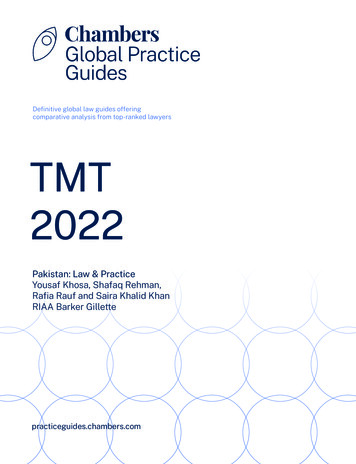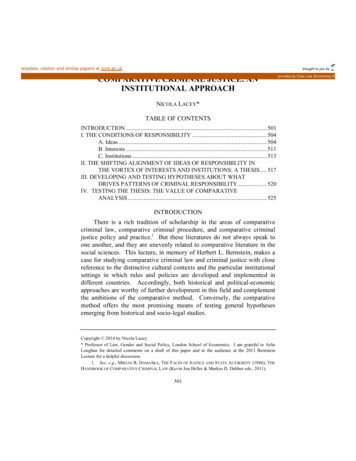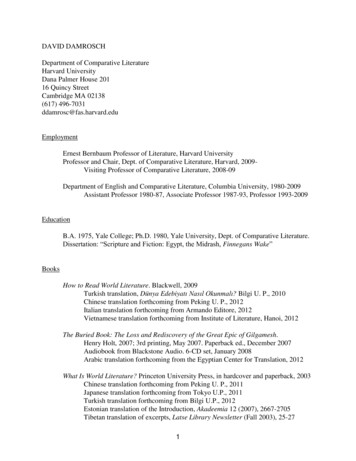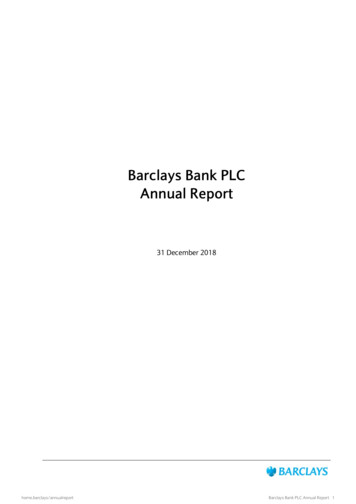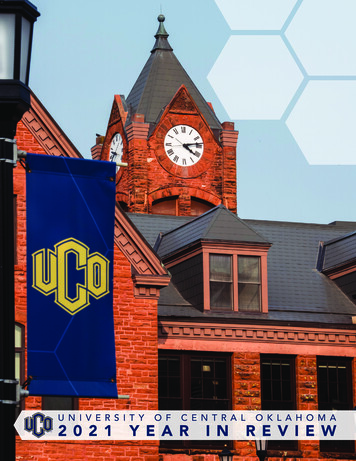
Transcription
GLOBAL PRACTICE GUIDEIRELANDDefinitive global law guides offeringcomparative analysis from top ranked lawyersAviation Financing& LeasingIrelandWalkerschambers.com
IRELAND Law and PracticeLaw and PracticeContributed by WalkersContents1. Aircraft and Engine Purchase and Sale1.1 Sales Agreements1.2 Transfer of Ownershipp.4p.4p.42. Aircraft and Engine Leasing2.1 Overview2.2 Lease Terms2.3 Lease Registration2.4 Lessor’s Liabilities2.5 Insurance and Reinsurance2.6 Lease Enforcement2.7 Lease Assignment / Novation2.8 Aircraft Deregistration and Export2.9 Insolvency Proceedings2.10 Cape Town Convention and Othersp.5p.5p.5p.6p.6p.7p.8p.10p.10p.12p.143. Aircraft Debt Finance3.1 Structuring3.2 Security3.3 Liens3.4 Enforcementp.15p.15p.16p.18p.182
Law and Practice IRELANDWalkers is a global, integrated and market-leading financialservices law firm that practices law across six jurisdictionsand has ten offices across the Americas, EMEA and Asia.Walkers has 115 partners and 860 staff, providing 24/7 service to its clients. The Irish office provides market-leadingIrish legal, tax, listing and professional services solutionsto local and international financial institutions, investmentmanagers, hedge funds, private equity groups and corpora-tions. Expertise covers asset management and asset finance,corporate and M&A, employment, finance and capital markets, insolvency and dispute resolution, investment funds,real estate, regulatory and tax, as well as listings and fiduciary services. The firm’s independent Corporate Servicesoffering, Walkers Professional Services, provides a broadrange of corporate, fiduciary and administration services tostructured and asset finance vehicles.AuthorsDavid McGovern is based in Walkers’Ireland office, where he is a partner andhead of the Asset Finance Group. He actsfor banks, financiers and operators ondomestic and multi-jurisdictional assetfinancing transactions involving corporateand commercial aircraft, rolling stock and other movableequipment. David advises clients on financing structuresused to finance and lease aviation assets, includingpre-delivery financing, warehouse facilities and loanfacilities, as well as on all aspects of the establishment andrunning of leasing companies in Ireland. He also adviseslessors in respect of fixed wing and rotary aircraft in theEMEA region, North and South America. David is amember of the Incorporated Law Society of Ireland andthe Dublin Solicitors Bar Association.Michael Caulfield is based in Walkers’Ireland office, where he is a seniorassociate in the Asset Finance Group, andadvises banks, financial institutions,international aircraft operating lessors,aircraft owners, financial arrangers andprivate equity groups on asset finance transactions. Headvises on the financing and leasing of aircraft, includinggovernment-supported financings, secured lending,cross-border and operating leases, the purchase and sale ofsingle aircraft and multi-aircraft portfolios, workouts andrestructurings, debt finance and security matters, domesticand cross-border tax-driven leasing, pre-deliveryfinancing, and sale and leaseback financing. He is amember of the Incorporated Law Society of Ireland andthe Dublin Solicitors Bar Association.Killian McSharry is based in Walkers’Ireland office, where he is an Of Counselin the Asset Finance Group. He advisesbanks, financial institutions, internationalaircraft operating lessors, aircraft owners,financial arrangers and private equitygroups on asset finance transactions. Killian has advisedon the financing and leasing of both fixed wing and rotaryaircraft, including government-supported financings,secured lending, cross-border and operating leases, thepurchase and sale of single aircraft and multi-aircraftportfolios, workouts and restructurings, debt finance andsecurity matters, domestic and cross-border tax-drivenleasing, pre-delivery financing, and sale and leasebackfinancing. He is a member of the Incorporated Law Societyof Ireland and the Dublin Solicitors Bar Association.Eimear Burbridge is based in Walkers’Ireland office, where she is an Of Counselin the Tax Group. She works with a broadrange of national and international clients,advising on a wide range of tax issues. Shespecialises in financial services, includinginvestment funds, insurance, structured products andsecuritisation structures. Eimear also advises companiesand investment funds on their Irish tax complianceobligations across a number of tax heads. She is a memberof the Incorporated Law Society of Ireland and the DublinSolicitors Bar Association3
IRELAND Law and Practice1. Aircraft and Engine Purchase andSale1.1 Sales AgreementsTaxes/Duties Payable Upon Execution of the SalesAgreementVATWhether there will be any VAT payable on the sale of theaircraft will be determined by the physical location of theaircraft at the point of sale. If the aircraft is physically locatedin Ireland at the time of sale, the place of supply for Irish VATpurposes will be Ireland. As a result, the seller will be liableto account for any Irish VAT chargeable on the supply, at23%. However, if the aircraft will be used outside the EU orby a transport undertaking operating for reward chiefly oninternational routes, Irish VAT will apply at 0%. The sellerwill be obliged to be registered for VAT in Ireland regardlessof whether the 0% or 23% rate applies.Stamp DutyIrish stamp duty legislation provides an exemption in respectof the lease, transfer and sale of an aircraft, regardless ofwhere the aircraft is located at the time of sale.Customs DutiesNo customs duty will be charged on the transfer of title ofthe aircraft where the aircraft is on the ground in Ireland andin free circulation in the EU.Customs duties will only apply on the import of an aircraftinto Ireland from outside the EU, or on the release of anaircraft in Ireland in circumstances where the aircraft is coming off a duty suspended procedure such as transit or inwardprocessing.Enforceability Against Domestic PartiesAs a matter of Irish law, translation, certification, notarisation or legalisation is not required for the enforceability of asale agreement against an Irish party.1.2 Transfer of OwnershipTransferring TitleTransfer of title is legally effected upon delivery of the billof sale, which will usually include engines installed on theairframe and installed parts on its face but does not set outthe entire commercial agreement between the parties, whichwill usually be set out in the aircraft sale and purchase agreement.If an aircraft registered in Ireland has a new owner, a changeof ownership form should be filed in and lodged with the4Irish Aviation Authority (“IAA”) – a new Registration Certificate will be issued to the new owner upon filing the form.The aircraft shall not be flown until the Registration Certificate is issued by the IAA in the new entity’s name and theCertificate is placed on board the aircraft.The sale of the ownership interest in an entity that owns anaircraft or engine is effectively recognised as a sale of suchaircraft or engine itself, to the extent that the entity in respectof whom the ownership interest is being transferred holdstitle to the aircraft or engine.Sales Governed by English or New York LawThere is no formal legal requirement under Irish law that abill of sale needs to be governed by Irish law. See discussionat 2.6 Lease Enforcement: Domestic Courts’ Approach toForeign Laws and Judgments, below.Generally, the transaction documents used in aircraft saletransactions (including bills of sale) are well-establishedforms and do not present a difficulty from an Irish legalperspective.Enforceability Against Domestic PartiesAs a matter of Irish law, translation, certification, notarisation or legalisation is not required for the enforceability of abill of sale against an Irish party.Registration, Filing and/or Consent from GovernmentEntitiesA bill of sale cannot be registered with the IAA or any Irishgovernment entity.It should be noted that if an aircraft registered in Ireland hasa new owner, a change of ownership form should be filed inand lodged with the IAA – a new Registration Certificate willbe issued to the new owner upon filing the form. The aircraftshall not be flown until the Registration Certificate is issuedby the IAA in the new entity’s name and the Certificate isplaced on board the aircraft. The IAA recommends at least20 working days from the receipt of all required items forthe process to complete.There are no government applications or consents requiredas a prerequisite to the execution and delivery of a bill ofsale in relation to an aircraft or engine registered in Ireland.Taxes/Duties Payable upon Execution of a Bill of SaleVATWhether there will be any VAT payable on the sale of theaircraft will depend on the physical location of the aircraft atthe point of sale. If the aircraft is physically located in Ireland
Law and Practice IRELANDat the time of sale, the place of supply for Irish VAT purposeswill be Ireland. As a result, the seller will be liable to accountfor any Irish VAT chargeable on the supply, at 23%. However,if the aircraft will be used outside the EU or by a transportundertaking operating for reward chiefly on internationalroutes, Irish VAT will apply at 0%. The seller will be obligedto be registered for VAT in Ireland regardless of whether the0% or 23% rate applies.Application of Foreign LawsStamp DutyIrish stamp duty legislation provides an exemption in respectof the transfer and sale of an aircraft, regardless of where theaircraft is located at the time of sale.There are no material restrictions imposed on domestic lessees making rent payments to foreign lessors in US dollars.Until recently, the Irish Revenue Commissioners (Irish Revenue) had extended by concession the stamp duty exemptionavailable in respect of the lease, transfer or sale of aircraftto also apply to the sale or transfer of shares in an aircraftowning entity. It is understood that Irish Revenue have beenreviewing historic concessions and that a number of recentapplications for concessionary treatment have been refusedby Irish Revenue. The position regarding the transfer of stockin an aircraft-owning entity is not entirely clear. Stamp dutyon the sale of shares in an Irish aircraft-owning companymay therefore be payable at the rate of 1%. The duty applieson the market value of the shares or the consideration paid,whichever is higher. Irish stamp duty should not apply to thetransfer of shares where the consideration payable for suchshares is EUR1,000 or less.Since 1 January 1993, there have been no foreign exchangecontrols in Ireland. Since the removal of exchange controls,the Financial Transfers Act, 1992 gives the Minister forFinance reserve powers to introduce restrictions on financialtransfers between the State and other countries in the formof regulations and prohibition orders.Customs DutiesNo customs duty will be charged on the transfer of title ofthe aircraft where the aircraft is on the ground in Ireland andin free circulation in the EU.A lessor does not have to be licensed or otherwise qualifiedin order to do business with a domestic lessee.Customs duties will only apply on the import of an aircraftinto Ireland from outside the EU, or on the release of anaircraft in Ireland in circumstances where the aircraft is coming off a duty suspended procedure such as transit or inwardprocessing.Mandatory Terms for Leases Governed by English orNew York Law2. Aircraft and Engine Leasing2.1 OverviewNon-Permissible LeasesSubject to the general legal principles of contract law, thereare no types of operating/wet/finance leases or leases concerning only engines or parts that are not permissible orrecognised in Ireland, as far as is known.A lease involving either a domestic party or an asset situatedin Ireland can be governed by a foreign law - see discussionat 2.6 Lease Enforcement: Domestic Courts’ Approach toForeign Laws and Judgments, below.Restrictions Concerning Payments in US DollarsExchange ControlsTaxes/Duties Payable for Physical Execution of a LeaseNo taxes/duties are payable for executing a lease physicallyin Ireland, or as a consequence of an original or copy of alease being brought into Ireland either physically or electronically.Licensing/Qualification of Lessors2.2 Lease TermsGenerally, English or New York law-governed lease agreements (and ancillary documents thereto) follow well-established forms and do not present a difficulty from an Irishlegal perspective.Tax and Withholding Gross-up ProvisionsGenerally, such terms are permissible from an Irish lawperspective. However, such provisions would need to bereviewed on a case-by-case basis, the enforceability of whichwill be a matter of the governing law of the lease.Parts Installed or Replaced After a Lease’s ExecutionThe leasing of spare engines and other parts (including suchparts as may become attached to the aircraft in the future)may be made a part of the aircraft lease. Spare parts may5
IRELAND Law and Practicealso be the subject of a separate lease. No special formalitiesare required.Risk of Title AnnexationThis will be a matter for the governing law of the lease. UnderIrish law, legal and practical risk can arise when enginesbecome attached to other aircraft in accordance with pooling agreements or if they become subject to encumbrances.As a result, the lease will usually provide for such eventualities and may provide for a separate recognition of rightsagreement to be entered into in favour of the lessor/owner/security trustee.Recognition of the Concepts of Trust/TrusteeThe concept of a trust and the role of an owner trustee undera lease are recognised in Ireland.2.3 Lease RegistrationNotation of Owner’s/Lessor’s Interests on AircraftRegisterThe purpose of registration is solely to establish the aircraft’snationality, thus determining the jurisdiction to whose regulations the aircraft will be subject and the person that willbe responsible for the airworthiness and maintenance of theaircraft. The registration of an aircraft does not establish titleto the aircraft, and does not constitute actual notice or constructive notice of ownership.Registration if Owner is Different from OperatorAn aircraft can be registered domestically in the name of theaircraft operator if the operator is not also the owner, or inthe name of the owner if the owner is not also the operator.Aircraft/Engine-specific RegistersThere is no specific register for leases concerning aircraft orengines. However, if the lease is registrable under the Convention on International Interests in Mobile Equipment andthe related Protocol on Matters specific to Aircraft Equipment (together the “Cape Town Convention”), it can beregistered on the International Registry as an internationalinterest.Registration of Leases with Domestic Aircraft RegistryA lease (and a lessor’s interest therein) cannot be registeredor filed in the domestic aircraft registry, and leases are notsubject to any consent from any government entity.6Requirements for a Lease to be Valid and RegistrableAs a matter of Irish law, translation, certification, notarisation or legalisation is not required for the enforceability of abill of sale against an Irish party.Requirements for Documents Concerning RegistrationIn order to register an aircraft, one must file a registrationform, as can be found on the IAA website, with supportingevidence as set out in the form. As part of the supportingevidence, an Export Certificate of Airworthiness or EASAForm 52 or an original Certificate of Airworthiness and avalid ARC must be submitted.2.4 Lessor’s LiabilitiesTax Requirements for a Foreign LessorA foreign lessor is not required to pay any income or capitalgains or other taxes upon leasing an aircraft or engine to adomestic lessee if the foreign lessor and domestic lessee areunconnected third parties. Irish legislation contains secondary liability provisions that may need to be considered incertain group situations.Effects of Leasing on the Residence of a Foreign LessorA foreign lessor could not be deemed to be resident, domiciled, carrying on business or subject to any taxes as a resultof its being a party to or its enforcement of the lease, provided that it is not otherwise resident in Ireland or does nothave a permanent establishment or other taxable presencein Ireland, or, if the lessor is so established in Ireland, that itdoes not act through a branch or agency in Ireland or othertaxable presence in Ireland in respect of its acts.Engine Maintenance and OperationsAircraft or engine maintenance and operations will be governed by the contractual provisions of the lease agreement,responsibility for which will typically reside with the lessee.See 2.4 Lessor’s Liabilities: Damage or Loss Caused by anAsset and 2.4 Lessor’s Liabilities: Priority of Third Parties’Rights, below.Damage or Loss Caused by an AssetUnder Irish law, the lessor/owner is primarily liable for lossand damage caused by an aircraft to third persons and property, though liability can be passed on to the lessee. However,as per s. 21(1) of the Air Navigation and Transport Act, 1936,the lessor/owner would be liable as if they were at fault forany material damage or loss caused to any persons or property from an aircraft while in flight, taking off or landing.
Law and Practice IRELANDBoth lessor and lessee are independently responsible fortheir own negligence in relation to the aircraft, both throughtheir acts and through their omissions. Liability to this canbe restricted or excluded via contract, but such terms willbe subject to reasonableness and it is not possible to restrictor exclude liability for death or personal injury due to negligence.Attachment by CreditorsThe lessee may have allowed certain liens to accrue againstthe aircraft (eg, a possessory lien arising from a third partyhaving bestowed labour on the aircraft so as to improve itscondition). See 2.4 Lessor’s Liabilities: Priority of ThirdParties’ Rights, below.Priority of Third Parties’ RightsUnder the Irish Air Navigation and Transport Acts, certainthird parties are granted a right to detain and, in some cases,to sell (or cause to be forfeited) aircraft in certain circumstances, whether the aircraft is registered in Ireland or not.These include, for example, airport charges, air navigationcharges, customs duties and unpaid tax.Other common liens include those that arise in the contextof storage, repair, maintenance or other services to aircraft,tax liens and judgement liens. The lessee, usually in breach ofthe terms of a lease, may have allowed certain liens to accrueagainst the aircraft – for example, a possessory lien arisingfrom a third party having bestowed labour on the aircraftso as to improve its condition. A lien for the salvage of theaircraft may also arise.Since liens are not capable of registration at the Irish CRO,and since there is no Irish aircraft mortgage register, liensmay often arise unbeknownst to the lessor.for enforcing the detention of such aircraft by authorisedpersons. A party who ignores such a detention order is guiltyof a summary offence.Revenue may seize and sell the aircraft for unpaid taxes owedby the owner.Pursuant to s. 5 of the Criminal Assets Bureau Act, 1996 (asamended), the Criminal Assets Bureau may confiscate assetsidentified or suspected as deriving directly or indirectly fromcriminal conduct.Pursuant to s. 4 of the Proceeds of Crime Act, 1996 asamended, the Irish High Court may (on application) make adisposal order in respect of property that constitutes directlyor indirectly the proceeds of crime.In an emergency, the IAA can give directions as to the useor possession of an aircraft.2.5 Insurance and ReinsuranceRequirement to Engage Domestic Insurance CompaniesIt is not mandatory for all or part of the insurances to beplaces with domestic insurance companies.Mandatory Insurance Coverage RequirementsThe EU regulation setting out minimum levels of insurancerequires that insurance cover exists for each and every flight,in compliance with the regulations.Placement of Insurances Outside of JurisdictionProfessional underwriters insurance can be placed outsideof Ireland up to 100% coverage.Pursuant to the Irish Aviation Authority (Nationality andRegistration of Aircraft) Order 2015 and the Air Navigationand Transport Acts, 1936-2005 (as amended), the IAA andDublin Airport Authority can detain or restrict the use of anaircraft and, if necessary, sell it in certain circumstances – forexample, where the aircraft is not in compliance with safetystandards, where airport charges have not been paid or ifthe IAA considers it necessary to secure compliance withStatutes and Statutory Instruments.Enforceability of ‘Cut-through’ ClausesCustoms officers may detain an aircraft in respect ofimported uncleared cargo remaining on board after a stipulated period until certain expenses for the safeguarding andremoval of the goods have been paid. Furthermore, in thecase of an item liable to forfeiture, any aircraft carrying itmay also be liable to forfeiture, and the owner and commander of the aircraft may also be liable to a penalty. TheAir Navigation and Transport Act, 1988 makes provisionAssignments of insurances/reinsurances are permitted.The general view is that “cut-through” clauses (under whicha reinsurer undertakes a direct relationship of indemnitywith the original insured under a reinsured policy) are notthought to be effective under Irish law on account of thedoctrine of privity and under insolvency law.Assignment of Insurance/Reinsurance7
IRELAND Law and Practice2.6 Lease EnforcementRestrictions on Lessors’ AbilitiesThe Irish courts recognise self-help remedies, and typicallyrecognise and enforce contractual arrangements betweenthe parties.In addition to the self-help remedy under Irish law, the owner will have the remedies available to it under the Cape TownConvention, including taking possession of the aircraft without a court order and deregistering and exporting an aircraftby exercising its rights under an IDERA.However, it should be noted that, in the majority of cases, theaircraft will not be located in Ireland and the lease is likelyto be governed by English or New York law. The effectiveness of these actions will therefore be determined by generalprinciples of enforceability under the governing law of thelease and in the jurisdiction in which the aircraft is located.Lessor Taking Possession of AircraftA termination of the lease should entitle the lessor to seekrepossession of the aircraft as a matter of contract without acourt order. It is important that the lessor strictly complieswith such procedure, as may be set out in the lease, in orderto validly take possession of the aircraft. If the lessee resistsrepossession, the lessor can apply to the court for an orderof delivery up and possession of the aircraft.Specific Courts for Aviation DisputesThe Irish Commercial Court is the forum for the determination of substantial commercial disputes in Ireland, and hasjurisdiction in respect of a claim or counterclaim relatingto any business document, contract and dispute where theclaim involved is greater than EUR1 million.For example, the Irish Commercial Court has previouslyaccepted jurisdiction of substantive causes of action in disputes relating to registrations originating entirely outsideIreland under the provisions of the Cape Town Convention,which were given effect in Ireland pursuant to the International Interests in Mobile Equipment (Cape Town Convention) Act, 2005 – eg, PNC Equipment Finance LLC v Aviareto Limited and Link Aviation LCC (unreported, High CourtDecember 17, 2012) and, more recently, Unicredit GlobalLeasing Export gmbh v Business Aviation Ltd. & anor [2019]IEHC 139.Summary Judgment or Other ReliefIf the lessor wishes to sue the lessee for the debt, this maydone by way of summary summons. However, possessioncannot be effected by way of summary judgment.8An injunction may be sought from the courts and, inextreme emergency, for example, the aircraft may be takenoutside the jurisdiction; this can be done without notice tothe other party to the proceedings.The purpose of the injunction is to require a party to do(mandatory) or refrain from doing (prohibitory) some act.Injunctive relief is equitable in nature and is a remedy ratherthan a cause of action. Injunctions are generally sought toprotect one’s rights where those rights have been breached orwhere an imminent breach of those rights can be identified.If an interim injunction is granted, it will be served on theother party along with the summons, the notice of motionand any affidavits submitted. The notice of motion will fix adate for the hearing of an interlocutory injunction at whichboth sides will be heard. If it declines to grant an interiminjunction, then it could grant leave to the applicant to servenotice on the other party of its intention to apply for an interlocutory injunction, and the court may allow a shorter noticeof that application than is usual.The court must be satisfied of a number of elements prior togranting an injunction: there must be a bona fide/genuine question to be determined; damages must not be an adequate remedy; and the balance of convenience must lie in favour of grantingthe injunction.The lessor, as any applicant for injunctive relief, will berequired to provide an undertaking and/or security for damages to the court against a wrongful claim.Domestic Courts’ Approach to Foreign Laws andJudgmentsFor disputes within the EU, choice of law clauses are recognised pursuant to Regulation (EC) 593/2008 (the RomeI Regulation).For non-EU disputes, the courts will generally recognise andrespect choice-of-law clauses under common law rules.Limited exceptions to the above general position arise wherethe courts may refuse to recognise choice of law clauses forpublic policy reasons, or where there are mandatory Irishlaw considerations – for example, with respect to consumerlaw matters.For disputes within the EU, choice of jurisdiction clausesare recognised under the Brussels I Regulations as transposed into Irish law under the Civil and Commercial Judgments Regulations 2002 and, for disputes in proceedingscommenced on or after 10 January 2015, Regulation (EU)
Law and Practice IRELAND1215/2012 (the Recast Brussels I Regulation) as transposedinto Irish law by the Civil and Commercial Judgments Regulations 2015.Where the dispute involves parties domiciled in countriesthat are not signatories to the Recast Brussels I Regulation,its predecessor or the Lugano Convention, the common lawrules of ‘most appropriate forum’ apply.Limited exceptions to the above general position arise wherethe courts may refuse to recognise choice of jurisdictionclauses where there are mandatory Irish law considerations– for example, with respect to consumer law matters or forpublic policy reasons.Domestic Courts’ Recognition of Foreign Judgments/AwardsThe means of enforcing a foreign court judgment dependmainly on the country or state that has handed down thejudgment, and the nature of the judgment or order.judgment has been obtained or alleged to have beenobtained by the commission of a fraud, trick or deliberately misleading circumstances; the procedures and rules of the court giving the judgment have not been observed; it is inconsistent with a judgment of the courts of Irelandin relation to the same matter; it is contrary to public policy or natural or constitutionaljustice of Ireland; the Irish courts have no jurisdiction over the matter; the jurisdiction of the court giving such judgment hasnot been exercised in circumstances an Irish court (as amatter of Irish law) will recognise as justifying enforcement of the judgment; and enforcement proceedings are not instituted in Irelandwithin six years of the date of the judgment.The enforcement of foreign arbitral awards in Ireland will begoverned by the Arbitration Act, 2010.Judgments in Foreign CurrenciesThe process of enforcing judgments of EU Member States isgoverned by one of the following:A lessor under an aircraft lease can obtain a judgment in aforeign currency. Regulation (EC) 44/2001 on jurisdiction and the recognition and enforcement of judgments in civil and commercial matters; Regulation (EC) 805/2004 creating a European Enforcement Order for uncontested claims; or Regulation (EC) 805/2004 on creating a EuropeanEnforcement Order for uncontested claims.Limitations on Lessors’ Actions Following TerminationDepending on the applicable rules, an application must bemade to the Master of the High Court. Once the foreignjudgment is recognised, it is considered by the Irish court asif it had been delivered by a court in Ireland, and the usualmethods of enforcement can be used.For foreign judgments that fall outside the above rules, thelessor/mortgagor must issue fresh proceedings in Ireland toenforce the judgment. However, the plaintiff will be able toobtain summary judgment in a new action in Ireland onthe grounds the defendant has no defence to the claim if therelevant judgment satisfies the following conditions: it is for a debt for a definite sum of money; it is final and conclusive; and it is given by a court of competent jurisdiction.However, the Irish Courts retain discretion to refuse torecognise and enforce a foreign judgment in the followingcircumstances: it is impeachable on the grounds of jurisdiction, fraud,public policy or natural or constitutional justice, or theThere are common law limitations. For example, a contractual provision conferring or imposing a remedy or anobligation following default may not be enforceable if it wasconstrued by an Irish court as being a penalty, particularly ifit involved enforcing an additional pecuniary remedy (suchas a default or overdue interest) referable to such default;furthermore, recovery may be limited by laws requiringmitigation of loss suffered.Lessor’s Requirement
aircraft, including government-supported financings, secured lending, cross-border and operating leases, the purchase and sale of single aircraft and multi-aircraft portfolios, workouts and restructurings, debt finance and security matters, domestic and cross-border tax-driven leasing, pre-delivery financing, and sale and leaseback financing.
